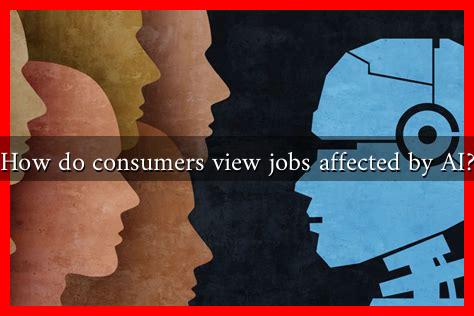-
Table of Contents
How Do Consumers View Jobs Affected by AI?
As artificial intelligence (AI) continues to evolve and integrate into various sectors, its impact on the job market has become a topic of significant discussion. Consumers, who are also employees and job seekers, have mixed feelings about the influence of AI on employment. This article explores how consumers perceive jobs affected by AI, highlighting their concerns, expectations, and the broader implications for the workforce.
The Dual Nature of AI in the Workplace
AI’s integration into the workplace can be viewed through two primary lenses: job displacement and job creation. While many consumers express concern about the potential for job loss, others recognize the opportunities that AI can create.
- Job Displacement: Many consumers fear that AI will replace human jobs, particularly in sectors like manufacturing, customer service, and data entry. A report by McKinsey Global Institute estimates that up to 800 million jobs could be displaced by automation by 2030.
- Job Creation: Conversely, AI is also seen as a catalyst for new job opportunities. The World Economic Forum predicts that AI will create 133 million new roles by 2022, particularly in fields like data analysis, AI maintenance, and ethical oversight.
Consumer Concerns About Job Security
One of the most significant concerns among consumers regarding AI is job security. A survey conducted by Pew Research Center found that 72% of Americans are worried about a future where robots and computers can perform most human jobs. This anxiety is particularly pronounced among workers in industries that are more susceptible to automation.
- Fear of Unemployment: Many consumers worry that AI will lead to widespread unemployment, particularly for low-skilled workers.
- Skill Gaps: There is a growing concern about the skills gap, as many workers feel unprepared to transition into new roles that require advanced technological skills.
- Economic Inequality: Consumers are also concerned that AI could exacerbate economic inequality, as those with advanced skills benefit while others are left behind.
Positive Perspectives on AI in the Workforce
Despite the concerns, many consumers also recognize the potential benefits of AI in the workplace. These positive perspectives often focus on how AI can enhance productivity and improve job satisfaction.
- Increased Efficiency: AI can automate repetitive tasks, allowing employees to focus on more complex and rewarding work. For example, AI-driven chatbots can handle customer inquiries, freeing up human agents to tackle more nuanced issues.
- Enhanced Decision-Making: AI can analyze vast amounts of data quickly, providing insights that help businesses make informed decisions. This capability can lead to better outcomes for both companies and consumers.
- Work-Life Balance: By automating mundane tasks, AI can contribute to a better work-life balance for employees, leading to higher job satisfaction.
Case Studies: AI in Action
Several companies have successfully integrated AI into their operations, demonstrating both the challenges and benefits of this technology.
- Amazon: The retail giant uses AI for inventory management and customer recommendations. While this has led to increased efficiency, it has also raised concerns about job displacement among warehouse workers.
- IBM: IBM’s Watson has been employed in healthcare to assist doctors in diagnosing diseases. This application of AI not only enhances patient care but also creates new roles for healthcare professionals who can work alongside AI systems.
Conclusion: Navigating the Future of Work
As AI continues to reshape the job market, consumers’ views on jobs affected by this technology are complex and multifaceted. While concerns about job displacement and economic inequality are prevalent, there is also a recognition of the potential for AI to create new opportunities and enhance job satisfaction. To navigate this evolving landscape, it is crucial for consumers, businesses, and policymakers to engage in open dialogue about the future of work and invest in education and training programs that prepare the workforce for the changes ahead.
In summary, understanding consumer perspectives on AI’s impact on jobs is essential for fostering a balanced approach to technological advancement. By addressing concerns and highlighting opportunities, society can work towards a future where AI complements human labor rather than replaces it.
For further reading on the impact of AI on jobs, visit World Economic Forum.

